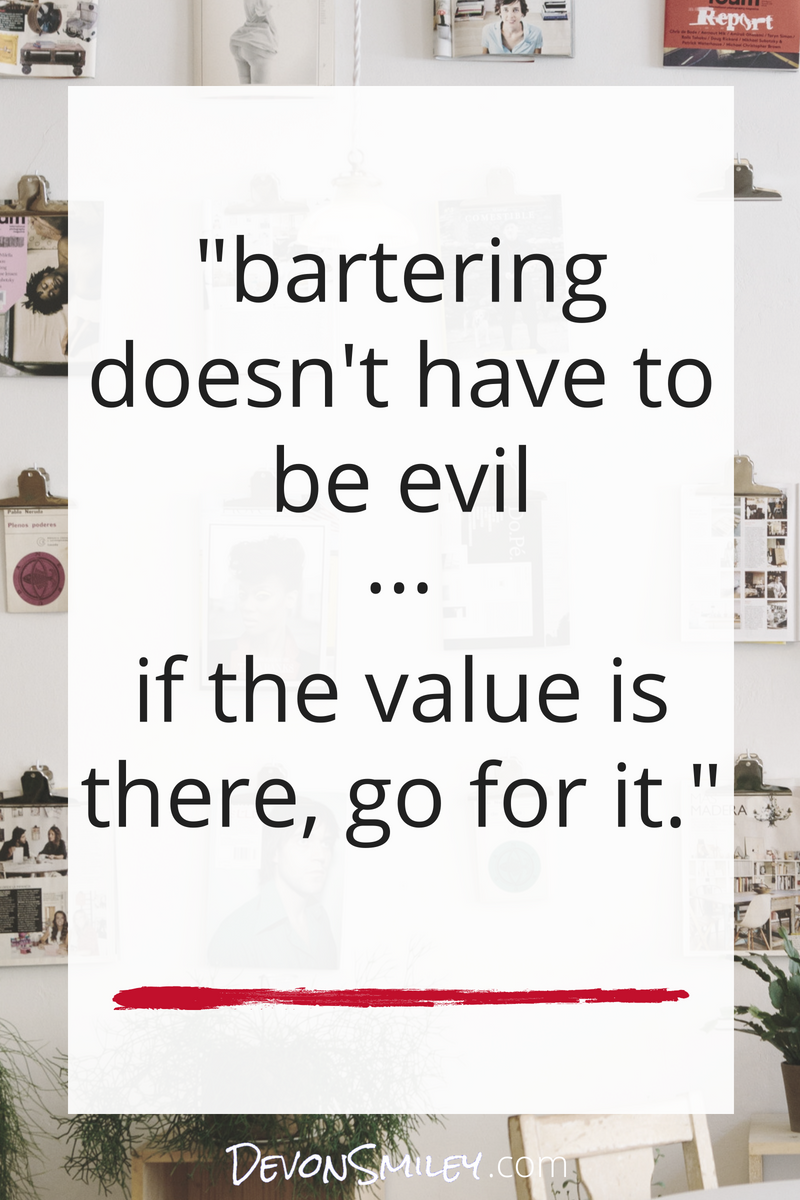Are you getting what you need out of the deal? Does it feel good to the other person? Super. Then you do you, boo.

One of the first pieces of advice I remember receiving when I started my business was that if I were going to be a “real entrepreneur”, and if I were going to be successful, then I had to never, ever, ever barter.
To accept a good or service in exchange for my work instead of cold hard cash would just devalue what I was doing and drive my business into the ground.
Who would ever take me seriously?
You can’t pay rent in scented candles!
Someone will end up paying you literal peanuts for your services! Ouf.
You may have received the same message. That bartering is evil and bad for business. But it’s not. Or at least it doesn’t have to be.
Here are my top tips for how to barter effectively
1) Be clear on what has value to you and your business
What are the investments you’ve been looking to make in your business? New logo? Starting a podcast?
What are the investments you’ve been looking to make in your life? Hitting the gym? Self-care on the massage table?
These are the things that you should be open to bartering on. If you were going to have to spend money/time/energy to bring those things into your business or life, then there’s a value to potentially trading your product or service for those items.
For example:
Let’s say you’re a coffee fiend. (who you?! never!) Your local small-batch roaster approaches you about doing some packaging design for them in exchange for 1/bag a week of their beans – for the next year.
- You like their coffee (win!)
- You would have been buying their coffee anyway (win!)
- You know that paying retail for those beans would equal more than your design fee (win!)
2) It’s not always about profit, or even breaking even
Sometimes it’s about building connections and fostering a relationship with other entrepreneurs. You may not gain ‘equivalent value’ on the exchange…but you could tap into a valuable referral source or wing (wo)man for building your business.
Especially when you’re getting started, having someone give your service or product a test run can be a valuable source of feedback. Think of it like a Beta and Business Development all rolled into one.
3) Keep it classy
Sometimes, someone may come to you with a barter proposal that just isn’t right for you. It could be something you don’t need or want, and they may not be able to offer useful referrals or feedback. In those cases, it’s important to stay polite. A straightforward ‘No thank you’ or ‘This isn’t a good fit for me right now, but if you’re interested in learning more about my work, would you like to set up a client consult?’ works well. Keep in mind that the other person has every right to ask, and you have every right to say no.
This week, your homework is to revisit the first tip: identifying what matters to you and your business. Take some time to work on this. I usually don’t get too sentimental, but I believe that once you know what you want, you’ll begin to notice the opportunities around you.
